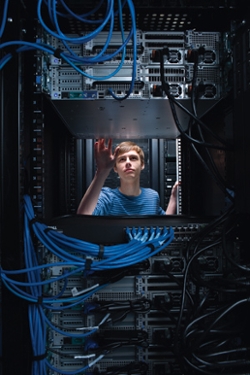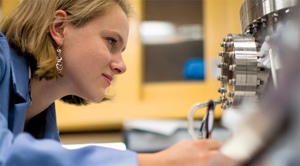Trading the Beach for the Research Lab
McCormick undergraduate researchers use summer break to break new ground
At any given time during the regular academic year, you’ll find about 150 McCormick undergraduates actively engaged in on-campus research. In the summer, that number often swells to 225.
For students who want to dive into their subject matter, summer provides the perfect atmosphere for a concentrated research experience. Without additional coursework to distract, students apply what they’ve learned in class to make new discoveries and advancements on their own.
For many students, these summer experiences can only be realized through funding sources like Northwestern’s Office of Undergraduate Research and McCormick, which funds about one in six undergraduate applicants.
“These summer projects provide immersive and invaluable experiential learning,” says Stephen Carr, associate dean for undergraduate engineering. “Students get a double benefit from their time in a research group—the pride of ownership that results from being published and the one-on-one engagement with our faculty.”
As told to Sara Langen.
Conor Hetland '15
Computer Engineering

Before college I liked science and particularly math a lot. At some point, I naturally slipped into thinking I wanted to study engineering. I took an engineering design class on the Northwestern campus over the summer in high school, which helped solidify my interest.
McCormick is a really great fit for me. I found the parallelism project in Introduction to Computer Systems very interesting and put a lot of work into it. Professor Peter Dinda was really helpful, so when I decided I wanted to do an independent study related to parallelism, he was the first person I asked.
I’m still undecided on what I want to do after undergrad, so I wanted to get some significant research experience over the summer to see how much I enjoy it. I also wanted to continue to develop the subject matter expertise I had worked on during the year and during my independent study.
My project involves designing and implementing a nested data parallel programming language that compiles to the C programming language. We aim to create a language that eloquently describes and reveals structures of certain parallel problems. This will mean parallel programming will require less effort and allow programmers to take advantage of parallel hardware capabilities without forcing them to learn and use cruder existing parallel languages.
"Research projects like this create an opportunity to gain expertise you won't typically get from a quarter-long class."
The project is partly based on NESL, a nested data parallel programming language developed in the mid-90s that contains a lot of the expressive power we’d like our language to have. By designing a new language with modern hardware in mind, we hope to find some new insights into the possible features and implementations of a similar language.
I’m a computer engineer, so I enjoy opportunities to program that require understanding of the underlying hardware. As a result, I was drawn to the relatively exotic and parallel architecture of graphics cards. I took Professor Robert Findler’s excellent Interpreters and Compilers classes, which inspired my interest in languages. The idea of linking together what I’d learned about programming graphics cards for general purposes, language design, and compilers was incredibly interesting.
Currently, I’ve got the functionality of a tiny Turing-complete parallel language, a language that is data parallel, but not nested data parallel. I should have nested data parallel functionality quite soon. At that point, the language will have the core of the functionality I’m trying to provide. I’m getting a little excited thinking about it. Even though it isn’t complete, it’s a lot of fun to write a tiny program in the language I’ve made and see it work.
One of the things I’ve learned is how to better explain computer science and parallel problems. Some of that communications aspect filters through to the language itself, because ideally you want somebody who’s looking at the program you’ve written to understand what you’re trying to do. The language you design should communicate something. That’s part of why having a parallel language like this is really cool.
Because of the quarter system, it’s rare to stick with a project for more than 30 or so hours and to use the same language and tools two quarters in a row. Research projects like this create an opportunity to gain expertise you won’t typically get from a quarter-long class.
Sarah Rappaport '17
Materials Science and Engineering and Music (French Horn)

Both my parents are engineers, so it’s in my blood. I’m a dual major in materials science and engineering and French horn performance. What I really liked about McCormick is the whole-brain engineering idea, the fact that they want you not to just focus on your technical classes, but also on the creative side of engineering.
I really enjoy research because it’s very different from course work. You’re not handing in papers or reading a chapter; you’re looking at work people are doing now. There isn’t necessarily a clear answer— there are only a lot of things you can try. It’s both concrete and abstract at the same time.
I’ve always found chemical reactions fascinating. I joined Professor Lincoln Lauhon’s lab because some of the work he’s doing lines up with my interest in creating a clean energy source. Finding a way to save the planet is my dream job, so being able to pursue that in this lab has been awesome. I like the idea of helping other people. Making progress in this area will benefit a lot of humanity.
My research focuses on preparing samples of MoS2 [molybdenum disulfide, an inorganic compound] and analyzing them using a microscope that can produce a digital 3D reconstruction of the sample. Most of my work has been focusing on electro-catalysis; I’m looking at incorporating those thin samples of MoS2 into an electrochemical cell—basically a fancy deconstructed battery—and running a bias through them to see if I can catalyze a reaction, specifically the electrolysis of water.
"Doing research and seeing things happen in real time are enlightening and incredibly empowering."
MoS2 has promising applications in the catalysis field. I hope to analyze these samples under the atom probe and see where di!erent impurity atoms are and then incorporate them into these cells to see how impurities might affect the catalytic process, or how much current is produced. It’s absolutely going to take more than a summer; I’m just getting started. It all depends on the grants we get, but my ultimate goal is to keep working on it throughout the year.
As an undergraduate, you learn a lot of concepts in classes. It’s very easy to just see them as abstract textbook concepts that don’t really have any application. Doing research and seeing things happen in real time are enlightening and incredibly empowering. It’s why you’re an engineer in the first place. Having this opportunity as an undergrad also helps you decide if it’s what you really want to do.
Both of my passions—engineering and music—require a lot of patience, especially research. There’s no specific end to it; you go until you find something, and then you find something else. It’s similar to practicing music where you work on specific pieces, but your work is really never done. All you can do is get better.
Eric Yang ’15
Biomedical Engineering

I’ve always had a passion for innovation. My dad’s an engineering professor, and he encouraged me to try to understand how everything works.
McCormick was a pretty easy decision for me—I was drawn to the course work, which sparked my interest in diagnostics. Last year, Professor Hao Zhang gave me the opportunity to work in his lab on research that may lead to a non-invasive diagnostic for breast cancer that only requires a blood sample from the patient.
When you work on a research project during the regular school year, the time you have in the lab is limited. I wanted to make some real progress and that could only be done by conducting research during the summer. I was lucky to get a McCormick Summer Research Award, thanks to funding from Ben Slivka and Lisa Wissner-Slivka. That was the only way I was able to fund my stay here.
I actually worked on two projects this past summer, both having to do with breast cancer. The primary one is to develop a way to filter out circulating tumor cells in late-stage patients. Around Stage 4, the tumor cells metastasize and go to other parts of the body. That’s why it’s so devastating—you can’t control where the cells go, and they can make tumors anywhere. Our idea is essentially to filter the tumor cells out of the blood.
We’re developing a microfluidics chip through which we can push the blood after introducing it to a solution of nanoparticles that have functionalized mRNA strands specific to the type of cancer cells we’re trying to filter out.
"I've always had a passion for innovation."
This chip sorts the cells by density as well as weight. When the cancer cells absorb the nanoparticles, those properties will change and it will be a lot easier for us to dissociate.
Our second project also deals with circulating tumor cells. A blood sample from a patient is mixed with our nanoparticles and incubated, allowing the nanoparticles to enter the cancer cells and produce a fluorophore when endogenous mRNA strands specific to cancer cells hybridize with the mRNA strands functionalized on the nanoparticle. Detection of the fluorescence is how we determine if the cancer is present or not.
Given the extremely low concentration of these tumor cells in the blood during early stages of cancer, the bulk of the effort has been to ensure that the sensitivity and specificity of our system and protocol are capable of reliable detection.
There’s a chance this could be used to detect breast cancer early. The primary project could improve the prognosis of the disease by helping prevent the metastasis of the cancer. We hope both projects will be applied in clinical settings.
I’ve learned a lot this summer, but one of the biggest things is how to conduct research independently. I’ve had to figure things out myself and learn organization skills and time management. I’ve also gotten experience presenting my project to an audience that wouldn’t necessarily understand the technical aspects.
It’s really unique that as undergraduates, we can have experiences like this. Not only do we get to conduct independent research, we also get to help pioneer innovative technology and create new knowledge. You don’t get an opportunity like that elsewhere.
